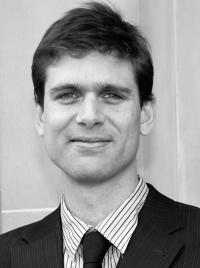Mobile Menu
- About Us
- Partnerships
- Events
- News
- Research
- Education
- Infrastructure
- Community

We caught up with T-CAIREM member Dr. Benjamin Haibe-Kains, a senior scientist with the Princess Margaret Cancer Centre. Dr. Haibe-Kains and his team use publicly available genomic datasets and data generated through his collaboration to better understand the biology underlying diseases and develop new predictive models to improve disease management.
What inspired you to pursue medicine?
As many families around the world, my family has been hit by cancer. My father died of lung cancer when I was very young. He was a computer engineer (it was more mechanical than software engineering in the 1980s). My adoptive father is an oncologist. I may have unconsciously followed their path, combining computer science and medicine by completing a Master's and then PhD in Bioinformatics at the Université Libre de Bruxelles and the Jules Bordet Institute in Brussels, Belgium. (My research focused on breast cancer at the time.) Although I loved machine learning and programming, I needed a larger purpose. Meeting cancer patients and knowing my research could help them (eventually) was the real driver that combined all of my interests and gave me a purpose.
What’s your proudest accomplishment?
My proudest accomplishment is undoubtedly the team of students, researchers and employees who choose to work in my lab. Witnessing the diversity of cultures and expertise, the way each member grows by interacting with each other and the broader scientific community is extremely satisfying. We all contribute to science in different ways; I consider mentorship to be one of the most important aspects of my work. Playing a role in the past, current and future successes of the lab members brings me a lot of joy and pride.
What excites you the most about the possibilities of AI in healthcare?
We have all become very connected and driven by data in many ways, but I feel medicine is lagging behind. The ways we monitor our health and interact with doctors will dramatically evolve in the coming years through better adoption of technologies to generate and share health-related data, optimize treatment and consult with healthcare workers. AI and machine learning will change healthcare in so many ways, ranging from allowing administrators to optimize hospital operations, assisting clinicians with diagnostics and treatment decisions, to helping patients actively monitor their health. AI will also allow the integration of more data modalities to attain supra-human capacity in predicting the patient trajectory and providing health workers with key insights.
What do you see as the biggest challenge to the field of AI in healthcare right now?
Sharing biomedical data is difficult as they often contain sensitive information about patients and their relatives. It is very easy to assess the risk of a potential information leak or breach of privacy. But how do we assess the risk of not sharing data? How do we estimate the risk of slowing down research, preventing the development of life-saving treatment modalities? There are ways to safely share or learn from large amounts of health-related data. The technologies are ready. But we need to change the current risk-averse mindset that hinders the collaborative framework we so desperately need for AI to improve healthcare.
What do you like to do when you aren’t working?
Get closer to nature. I love hiking with my family and seeing my kids so interested about the world around us. Planet Earth is a marvel, I want them to be aware of that so the next generation will do better with preserving our environment.
Are there any projects or initiatives you’re working on right now?
I am interested in challenging the status quo when it comes to research transparency and reproducibility. It starts with learning from more data and improving the ways researchers can collaborate. I am fortunate to work with many colleagues within the Princess Margaret Data Science Program and the Radiomics for Radiotherapy Research Program within the UHN/UofT Radiation Medicine Program to improve access to data and enable machine learning applications in medicine. I am also actively involved in the Terry Fox Marathon of Hope Cancer Centre Network, including the new Digital Health and Discovery Platform in Canada, and the new Break Through Cancer Foundation in the U.S. I have also co-founded the MAQC (Massive Analysis and Quality Control) Society to communicate, promote, and advance reproducible science principles and quality control for analysis of the massive biomedical data. I think these initiatives hold the potential to improve the way we do science and successfully use AI in medicine.
